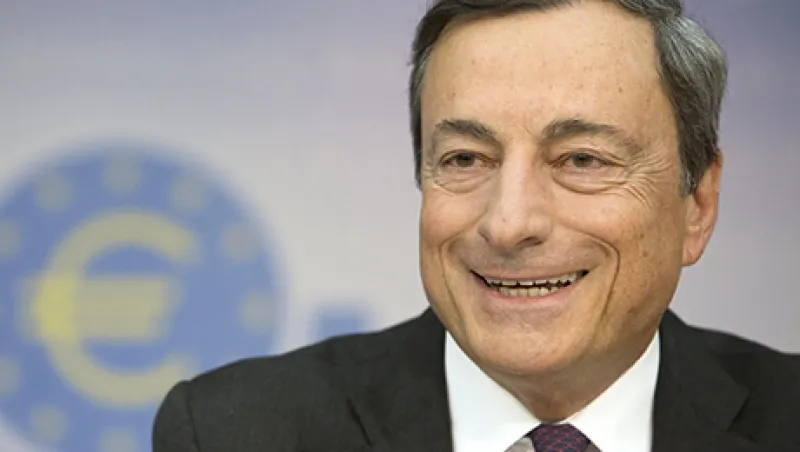At first sight, Italy looks like an exceptionally unpromising country for investors. Many analysts think it has the world’s lowest underlying growth rate — the rate of average output growth that can be achieved without fueling unsustainable inflation. Moreover, its ability to do anything about this through economic reforms is hobbled by a fractious and semiparalyzed political system, which Matteo Renzi, Italy’s prime minister since February, is attempting to prod into action through reforms.
Despite these factors, investors see selective stock opportunities in Italy, even though they are skeptical that Renzi will be able to reform the country any time soon. “This is a country which has some challenges to face, but it is not a country in acute stress,” says Jean Médecin, a member of the investment committee of Carmignac Gestion, the €49 billion ($62.6 billion) French asset management firm. “Although people have been frustrated by a lack of clear reforms in the labor market in particular, Italy is not in a state where it doesn’t have time to implement reforms.”
Even if there is no immediate crisis, however, Italy’s economy leaves a lot to be desired. London-based Mirko Cardinale, head of asset allocation for Europe, the Middle East and Africa at the $280 billion in assets Russell Investments, calculates Italy’s current rate of underlying growth as “around zero, without a big change in current policy.” He blames this in part on the high tax burden on labor, which he calls “the biggest problem in the Italian economy.” As a result, the difference between the employer’s cost of hiring a worker and the worker’s net pay is “probably the biggest in the world.” This gap creates a high rate of unemployment, depresses domestic demand and makes companies less competitive, he says. Cardinale’s conclusion? The Italian equity market, he says, “does not offer particularly good value.”
Investors believe that Renzi understands the need for labor market reforms and praise his policy of concentrating first on changes aimed at increasing the ability of the government and legal system to get things done. In August Italy’s upper parliamentary chamber, the Senate, voted in favor of measures to slim itself down and strip itself of its power to hold no-confidence votes. Renzi is also trying to boost the efficiency of Italy’s civil justice system, which impedes businesses by taking so long to reach decisions in commercial disputes. Carmignac’s Médecin notes that civil cases take about eight years on average to settle, among the slowest of any developed country.
Many investors are wary of basing investment decisions on top-down political changes in Italy, in part because the timing and degree of eventual success are uncertain. In addition, investors have a sense that even without reform, Italy has a sustainable economic and financial system. Médecin cites the fact that its budget deficit remains below the 3 percent required by the European Union’s Stability and Growth Pact, designed to prevent countries from falling into unsustainable fiscal deficits. He also notes Italy’s favorable trade position, with a current-account surplus of 1 percent of gross domestic product in 2013.
“Even though Italy needs to implement reforms to boost its medium- to long-term potential, we have to bear in mind that it is not under immediate pressure,” says Médecin. “It’s a different picture from France.” France has posted current-account deficits for years, and in September the government forecast a fiscal deficit of 4.4 percent.
The excessive sense of crisis felt by some investors in Italy may present opportunities for Italian stocks, particularly for bank shares.
James Buckley, head of European equities at €41 billion Baring Asset Management in London, likes UniCredit Group, “one of the cheapest European banks on a price-to-book basis,” he says, at a 24 percent discount to book value. He notes that French banks are trading around book value — higher than their Italian counterparts — even though France’s financial system may be in worse shape.
Investors think Italy is also particularly well placed to benefit from the European Central Bank’s low benchmark rate, which was reduced by 10 basis points, to 0.05 percent, in September. This will help to maintain cheap financing for small and midsize businesses (SMEs), which are often regarded as the backbone of the Italian economy, as well as to boost their export competitiveness by keeping the euro weak.
Italy’s SMEs have attracted investors wary about Italy as a whole. Italy’s €198 billion Pioneer Investments, a unit of UniCredit, is currently underweight Italian stocks as a whole but overweight small caps. “Italian small caps have had a strong rebound because of monetary policy,” says Monica Defend, head of global asset allocation research for Pioneer in Milan. “This is the side of Italy that has benefited the most from [ECB monetary policy].” Within small caps, Pioneer likes financial services companies that primarily serve the domestic market, and industrial companies with strong exports.
Investors say that the ECB’s September announcement of an additional growth-boosting monetary measure, the purchase of packages of SME loans to free bank balance sheets and spur lending, will benefit both SMEs and banks. Largely because of the ECB’s reduction of rates and SME funding, Carmignac also favors UniCredit, as well as Turin-based Intesa Sanpaolo.
The sharp rise of Italian bank shares has fueled the 13 percent surge in Italy’s FTSE MIB stock index this year, although many investors think they still offer value even after these share increases.
Over the short term, ECB president Mario Draghi’s policies present more opportunities for investors in Italy than do those of his compatriot Renzi. Italian economic reform looks like a bonus for investors, if it actually transpires, rather than an absolute condition for investing.
Get more on equities.






